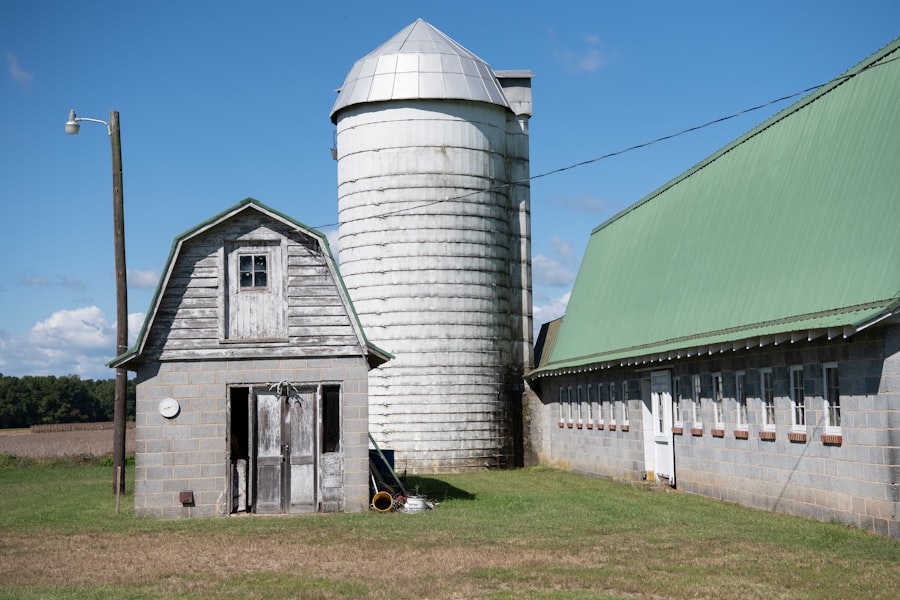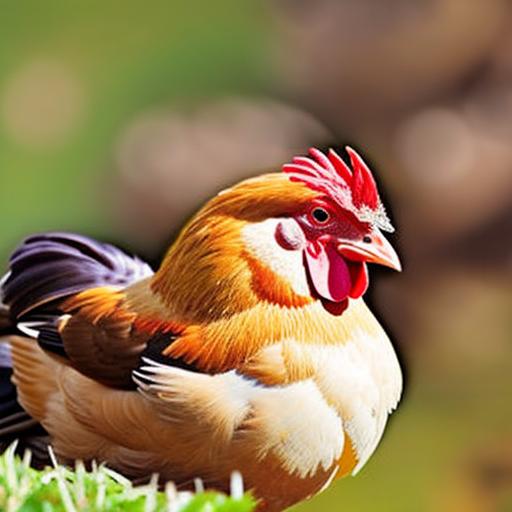Keeping chickens has become a popular trend among homeowners in recent years. Not only do chickens provide fresh eggs, but they also offer natural pest control and fertilizer for the garden. In addition, chickens can be a fun and educational addition to any backyard. In this article, we will explore the benefits of keeping chickens, how to choose the right chicken coop, the ideal size and design of a chicken coop, the importance of choosing the right location for the coop, tips on feeding and watering chickens, cleaning and maintaining the coop, protecting chickens from predators, providing adequate ventilation, and tips for keeping happy and healthy chickens.
Key Takeaways
- Keeping chickens has many benefits, including fresh eggs, natural pest control, and fertilizer for your garden.
- When choosing a chicken coop, consider factors such as size, materials, and ease of cleaning.
- The size and design of your chicken coop should provide enough space for your chickens to move around comfortably and access food and water.
- The location of your chicken coop should be in a safe and secure area, away from predators and extreme weather conditions.
- Feeding and watering your chickens regularly, cleaning and maintaining the coop, and protecting them from predators are all important factors in keeping happy and healthy chickens.
Benefits of Keeping Chickens
One of the main benefits of keeping chickens is having a constant supply of fresh eggs. Not only are fresh eggs tastier than store-bought ones, but they are also more nutritious. Chickens that are allowed to roam freely and eat a varied diet produce eggs that are higher in omega-3 fatty acids and vitamins A and E. In addition to fresh eggs, chickens also provide natural pest control. They eat insects such as slugs, snails, and ticks, which can be harmful to gardens and humans. Chickens also produce high-quality fertilizer for the garden. Their droppings are rich in nitrogen, phosphorus, and potassium, which are essential nutrients for plants.
Choosing the Right Chicken Coop
Choosing the right chicken coop is crucial for the health and well-being of your chickens. There are several factors to consider when selecting a coop. First, you need to determine the size of the coop based on the number of chickens you plan to keep. Each chicken needs at least 4 square feet of space inside the coop and 10 square feet of space in the outdoor run. The coop should also be made of sturdy materials that can withstand harsh weather conditions and protect your chickens from predators. Finally, consider the style of the coop. There are many different styles to choose from, including traditional barn-style coops, A-frame coops, and mobile coops.
Chicken Coop Size and Design
The size and design of a chicken coop depend on the number of chickens you plan to keep and their breed. As mentioned earlier, each chicken needs at least 4 square feet of space inside the coop and 10 square feet of space in the outdoor run. If you have a small backyard, you may need to limit the number of chickens you keep or consider a smaller breed that requires less space. The design of the coop should also take into account the climate in your area. For example, if you live in a hot climate, you may need to provide additional ventilation or shade for your chickens.
Chicken Coop Location
Choosing the right location for your chicken coop is essential for the health and safety of your chickens. The coop should be placed in a shaded area with good drainage to prevent flooding during heavy rain. It should also be protected from strong winds, as chickens are susceptible to drafts. In addition, the coop should be located away from any potential sources of contamination, such as septic tanks or compost piles. Finally, consider the proximity of the coop to your house. You want it to be close enough that you can easily access it for feeding and cleaning, but not so close that it becomes a nuisance.
Feeding and Watering Chickens

Feeding and watering chickens is relatively easy, but there are a few tips to keep in mind. First, invest in a feeder and waterer that are easy to clean and refill. Chickens can be messy eaters, so it’s important to clean their feeders regularly to prevent the buildup of bacteria. Similarly, their waterers should be cleaned and refilled daily to ensure they have access to clean water. In addition to commercial chicken feed, you can also supplement their diet with kitchen scraps and garden waste. Just make sure to avoid feeding them anything toxic, such as onions, garlic, or avocado.
Cleaning and Maintaining the Chicken Coop
Cleaning and maintaining the chicken coop is crucial for the health and well-being of your chickens. The coop should be cleaned regularly to prevent the buildup of bacteria and pests. Remove any soiled bedding and replace it with fresh bedding. Scrub the walls and floor of the coop with a mild detergent and rinse thoroughly. In addition to regular cleaning, the coop should also be inspected for any signs of damage or wear. Repair any holes or cracks in the walls or roof to prevent predators from gaining access to the coop.
Protecting Chickens from Predators
Protecting chickens from predators is essential, as they are vulnerable to attacks from animals such as raccoons, foxes, and hawks. The first line of defense is a secure fence around the coop and outdoor run. The fence should be buried at least 12 inches deep to prevent predators from digging under it. It should also be tall enough to prevent predators from jumping over it. In addition to a secure fence, make sure to lock the coop at night to keep out nocturnal predators. Consider installing motion-activated lights or a security camera to deter potential predators.
Providing Adequate Ventilation
Providing adequate ventilation in the chicken coop is crucial for preventing respiratory problems and keeping the chickens comfortable. Good ventilation helps remove moisture, ammonia, and other gases that can build up in the coop and cause respiratory issues. It also helps regulate temperature and humidity levels inside the coop. To provide adequate ventilation, make sure there are vents or windows on opposite sides of the coop to allow for cross-ventilation. You can also install a fan or exhaust system to improve air circulation.
Conclusion and Tips for Keeping Happy and Healthy Chickens
In conclusion, keeping chickens can be a rewarding and enjoyable experience. Not only do chickens provide fresh eggs, natural pest control, and fertilizer for the garden, but they also make great pets and can be a source of entertainment for the whole family. To keep your chickens happy and healthy, make sure to choose the right chicken coop, provide adequate space and ventilation, feed and water them properly, clean and maintain the coop regularly, protect them from predators, and provide them with enough space to roam and play. With proper care and attention, your chickens will thrive and provide you with years of enjoyment.
If you’re interested in learning about the best way to keep chickens, you might also find this article on chicken coop interior ideas from Poultry Wizard helpful. It provides creative and practical suggestions for designing the inside of your chicken coop to ensure the comfort and well-being of your feathered friends. From nesting boxes to perches and ventilation, this article covers all the essential elements to create a cozy and functional space for your chickens. Check it out here!
FAQs
What is the best way to keep chickens?
The best way to keep chickens is to provide them with a safe and secure coop, access to fresh water and food, and a clean and dry environment.
What should I feed my chickens?
Chickens should be fed a balanced diet that includes a mix of grains, protein, and calcium. Commercial chicken feed is a good option, but you can also supplement their diet with kitchen scraps and garden greens.
How often should I clean the chicken coop?
The chicken coop should be cleaned at least once a week to prevent the buildup of bacteria and parasites. You should also spot clean the coop daily to remove any droppings or wet bedding.
How much space do chickens need?
Chickens need at least 4 square feet of space per bird in the coop and 10 square feet of space per bird in the outdoor run. However, more space is always better for the health and happiness of your chickens.
What kind of bedding should I use in the chicken coop?
The best bedding for the chicken coop is straw, wood shavings, or shredded paper. Avoid using cedar shavings or sawdust, as they can be harmful to chickens.
Do chickens need a rooster to lay eggs?
No, chickens do not need a rooster to lay eggs. Hens will lay eggs regardless of whether there is a rooster present or not. However, if you want fertilized eggs to hatch into chicks, you will need a rooster.
Meet Walter, the feathered-friend fanatic of Florida! Nestled in the sunshine state, Walter struts through life with his feathered companions, clucking his way to happiness. With a coop that’s fancier than a five-star hotel, he’s the Don Juan of the chicken world. When he’s not teaching his hens to do the cha-cha, you’ll find him in a heated debate with his prized rooster, Sir Clucks-a-Lot. Walter’s poultry passion is no yolk; he’s the sunny-side-up guy you never knew you needed in your flock of friends!







